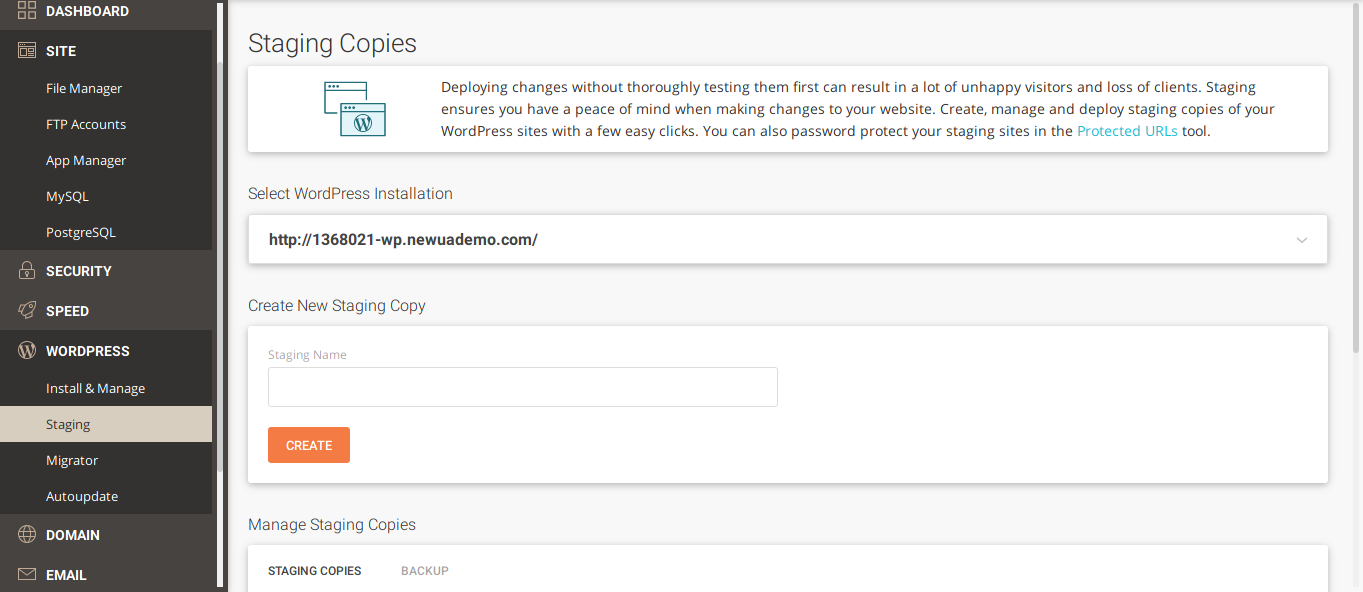
SiteGround had introduced its cloud hosting service in the year 2010. Currently, it is offering 4 cloud hosting plans – Entry, Business, Business Plus, and Super Power. The four plans are priced at $80, $120, $160, and $240 respectively. The Entry plan servers are equipped with 4GB RAM, a dual-core processor, and a 40GB SSD. The Business plan servers have 6GB RAM, 60GB SSD, and a three-core CPU. The next plan i.e. Business Plan offers a powerful server with a quad-core CPU, 8GB RAM, and 80GB SSD. The Super Power servers have an octa-core processor, 120GB SSD, and 10GB RAM. The bandwidth for each plan is capped at 5TB.
In addition to the above four plans, SiteGround also allows users to create a plan of their own. The max supported RAM is 128GB. Your server can have a 32 core CPU and up to 1 terabyte SSD memory. Each server SiteGround owns is powered by CentOS. For those who don’t know, CentOS is one of the most reliable operating systems right now.
SiteGround’s cloud servers are powered by the best available hardware. The web hosting firm uses the latest virtualization technology to partition resources on its server. SiteGround Cloud servers support PHP, the programming language that powers Facebook and WordPress. They are powered by the Apache/Nginx web servers.
When companies such as DigitalOcean, Linode are offering a cloud VPS for $5, should you buy a cloud hosting plan from SG whose plans start at $80? To get the answer to this question, you should first go through our Shared vs VPS hosting article and then go through the below paragraphs. If you know the difference between Shared and VPS hosting and you want to know whether SiteGround is a reliable cloud hosting service provider or if your site is performing really well in search engines and you want to provide your website visitors a better experience, go through the following paragraphs:
-
SiteGround cloud hosting review
- SiteGround shared vs VPS
- Uptime, support, documentation.
- Autoscale
- WHM
- Moving from shared to Cloud
- Private Nameservers
- CDN and data centers
- Technical things are taken care of by SiteGround staff
- SFTP, SSH, and FTP access
- Dedicated IP address
- Pros
- Cons
- Find the Siteground Cloud hosting plans expensive?
SiteGround cloud hosting review
Unlike shared hosting, SG imposes no restrictions on the number of visitors your site can get. In SG cloud VPS service, there’s no restriction on the number of visitors your website can get but there’s a bandwidth limit of 5TB. 5TB is a huge amount of data. You’ll also get a fixed amount of resources that you can utilize as per your requirements.
Uptime, support, documentation.
SG promises an uptime of 99.9%. Its support team is online throughout the day i.e. 24 hours. Thus, whether it’s 3 am or midnight, you can raise a ticket if you’re facing any issues with the site.
Autoscale
The major benefit of the SiteGround managed cloud hosting service is that you can add extra resources to the server with a few clicks of the button. SG lets you specify the auto-scaling conditions i.e. it can automatically add resources when your CPU or RAM usage has reached a certain level. SiteGround lets you specify the amount of RAM or CPU cores that should be added when the threshold limit is reached.
WHM
SiteGround Cloud plans give you access to WHM aka web hosting manager. You can use the WHM tool to manage your site and the server. If you’ve changed the nameservers in your domain registrar’s dashboard to the one provided by SiteGround, you can access WHM by adding WHM to your domain and opening the URL. For example, if example.com is your domain, to access the web hosting manager, open example.com/WHM in the browser. If you have not changed the nameservers yet, you can access the WHM by entering the hostname in the browser’s address bar and pressing the enter button.
If the traffic to your website has increased substantially and you think your existing shared server is incapable of handling it, you can migrate your account from shared to the cloud by simply raising the ticket. During the migration process, SiteGround’s staff will ask you to buy a plan. Once you buy a plan, one of the SiteGround engineers will move your site from a shared server to the cloud server. Before handing over the server, the engineer will check the performance of the server and the software settings to make sure that the site is running smoothly.
Private Nameservers
People often use tools that reveal the company which is hosting the website. The tools scan the DNS records to find out the site’s hosting service provider. SiteGround allows you to replace SG’s provided name in the Nameserver with a custom one.
CDN and data centers
Unmanaged cloud VPS servers don’t provide a CPanel or WHM software. Thus, there’s no one-click option to activate Cloudflare on the server. SiteGround, in contrast, allows you to enable Cloudflare with a single click. Cloudflare has one of the best network infrastructures in the world. It has several data centers and many POP locations. SiteGround data centers are situated in Asia, Europe, and the USA.
Technical things are taken care of by SiteGround staff
Maintaining the server software, configuring the web server, installing an SSL certificate, enabling caching, backing up your website data regularly on an unmanaged server can be a frustrating task. SiteGround’s cloud hosting plan includes a free backup service. How does the backup feature work? SiteGround will backup your website automatically every day. It stores 7 backups at a time. When a new backup is ready, the oldest one will be removed permanently from the server.
In addition to the backups, SiteGround cloud servers also let you switch your HTTP-only site to HTTPS. SiteGround’s engineers will keep the server’s software and OS up to date. When a new OS security patch is available, the engineers will install the patch for you.
SFTP, SSH, and FTP access
SSH protocol allows you to log in to a remotely located server and run Linux commands. SFTP is similar to SSH but it supports file-related operations only. For example, you can either get a file from a server or put a file on it. In addition to SSH and SFTP, SG also supports FTP.
Dedicated IP address
Unlike shared web hosting in which several sites share the same IP address, your SiteGround cloud server will have a dedicated IP address. Sites that you’ve built will share the same IP.
Pros
Reliable and experienced company: SiteGround is one of the most reliable companies on the web. It is in the web hosting business for 15 years.
Several features: The managed cloud servers of SiteGround not only give you access to WHM but also provide several additional features.
Great uptime and performance: As your server will be assigned a fixed amount of resources, the performance of your site will be great. Also, SG provides guaranteed uptime of 99.9%.
Money-back guarantee: If for some reason, you want to cancel your cloud hosting plan within 14 days of purchasing it, you can apply for a refund.
Cons
Although CentOS is a reliable OS, SiteGround management should think of providing its users an option to choose an OS.
Find the Siteground Cloud hosting plans expensive?
Cloudways and WP Engine are the best alternatives to Siteground’s managed hosting service. WP Engine offers 10 premium StudioPress themes (worth $380) with each of its cloud hosting plans. Cloudways provides similar features as Siteground. Also, its plans are cheaper compared to Siteground.
Final thoughts: Siteground’s cloud hosting plans offer several features. If the budget is not a problem for you, you should try out Siteground.


